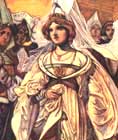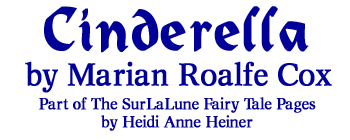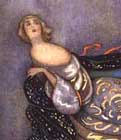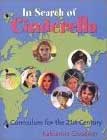
Cinderella:
345 Variants
by Marian
Roalfe Cox
SurLaLune's
Cinderella Area
SurLaLune Fairy Tales Main Page
241
Imbriani,Vittorio. La Novellaja Fiorentina, Fiabe e Novelle stenografate in Firenze dal dettato popolare, ristampa accresciuta di molte novelle inedite....nelle quali e accolta integralmente La Novellaja Milanese. Livorno, 1877. Pp. 202-207. No. XV.
"LA BELLA CATERINA."
ABSTRACT
Ill-treated heroine (by mother and sister)--Heroine sent to ask for sieve from wicked fairies Old man aid-- -Following old man's counsel, heroine puts stick instead of linger in key-hole; does sewing, etc., for cats; chooses poorest fare and worst dress from cat "Mammone"; turns round as bidden when cock crows, and gets star on brow--Ugly sister offends old man; gets finger chopped off in key-hole; maltreats cats; chooses best fare and best dress; breaks glass stairs; turns when donkey brays, and gets ass-tail on brow--Prince comes for heroine, who is hidden in cask--False bride--Heroine heard singing from cask--Villain Nemesis. Mother and sister in cask have boiling oil poured over them--Happy marriage.
TABULATION
(1) Countrywoman has two daughters. Caterina is very beautiful, bat mother loves ugly daughter best, and tries all possible means to spoil Caterina's beauty. At last she plots with ugly daughter to send Caterina to get sieve from fairies, who are wicked, and will be certain to scratch her Lace. She calls Caterina, tells her they must make bread, and there is no sieve in house to sift flour; she must go at once to wood, and ask fairies for theirs. Caterina turns pale, dreading treatment of fairies, and begs mother not to send her. Mother and sister are so unkind that fairies could not treat her worse, so she goes.-- (2) Entering the wood, she meets old man, who asks why she looks so troubled. She tells all. She need not fear fairies; he will tell her what to do. ''First tell me what is making my head itch?" Caterina looks, and says, "I see pearls and diamonds." "Pearls and diamonds shall fall to your lot. When you get to fairies' house, knock, and if they say, 'Put your finger in key-hole,' put in a stick, which they will chop off. They will take you to room full of cats, some sewing, some spinning, some making hose-- all engaged in some work. Without being asked, you must help each one to finish work. Then in kitchen you will see cats at work; help them likewise. You will presently hear the cat Mammone called. All the cats will tell her what you have done for them. Mammone will ask what you would like for dinner-- black bread and onions, or white bread and cheese. Say, 'Black bread and onions'; they will give you the other. Mammone will invite you to ascend crystal staircase. Be careful not to break it. Afterwards, choose always the worst dress of those offered you." Heroine thanks old man, and promises to obey.-- (3) When door is opened to her she asks for sieve. "We will give it you presently; come in and wait a bit." When she sees cats at work, she says, "Poor little kittens Goodness knows how it must hurt your claws Give it to me; I'll do it." In two twos (in quattro e quattr'otto) she has finished each one's work. In the kitchen she scrubs, sweeps, and puts all the furniture in order. Mammone is called; cats say, "She did my cooking," "She made my stockings," etc., etc., and bound about the room in joy. Mammone asks what she would like to eat. "Give me black bread and onions, I am not accustomed to anything else."1 Cat Mammone gives her white bread and cheese; then invites her up glass stair case. Caterina takes off shoes so as not to scratch stairs. Offered choice of dresses, she takes the worst, and brass instead of gold. Mammone tells fairies to give her best dress and jewels set in gold. When she is arrayed like a queen, Mammone says, "Take the sieve and leave this house. If you hear donkey bray, don't turn; if cock crows, turn round." Caterina obeys.-- (4) She takes no notice when donkey brays; when cock crows she turns, and a shining star suddenly comes on her head. She reaches home, and mother and sister are still more envious.-- (5) Sister will visit fairies. Entering wood, she also meets old man. "Where are you off to so joyfully?" "Mind your own business." "Go where you like, then; I'll see you again to-morrow.' She spoils fairies' door with her banging; gets finger chopped off through keyhole; sees sieve on ground when door opens, and calls out in rage, "This your sieve, you accursed people?" Seeing cats at work, says, "Confound you, cats, what are you slaving for, you stupids?" and pricks one's claws with needle, ducks another in boiling water, hits others over the ribs with broom and spindle. Great uproar: cats dash about screaming with pain. Cat Mammone appears, and hears what they have undergone. Quite seriously Mammone says to ugly sister she must be hungry; would she like black bread and onions, or white bread and cheese? "You're a nice creature! if you came to my house you wouldn't be offered black bread and onions, and you wouldn't have your finger chopped of I'll take white bread and cheese." They bring the other. She breaks the glass staircase from top to bottom; when offered brocade dress trimmed with gold pendants, or fustian gown with brass pendants, chooses the former. They give her the latter. She leaves in a rage. Mammone says, "If cock crows, keep straight on; if donkey brays, turn round and you'll have a fine sight."-- (6) Donkey brays; she turns, getting ass-tail on brow. She runs home in terror, screaming:
"Mamma dear, see!
Mamma dear, see!
The ass's tail has stuck to me."
(7) Meanwhile Caterina, still more lovely since visit to fairies, has been seen by king's son, who falls in love with her, and obliges king to consent to his marrying her. Wedding day is fixed, mother and sister not daring to oppose king.-- (8) But on wedding morning Caterina is put in cask and shut up in cellar; ugly sister is dressed in her clothes and jewels, and mother cuts off ass-tail and binds her head up in a veil. When king's son and his court arrive, mother says, "Here's your bride, lovely and apparelled." He is about to take her hand, supposing it to be Caterina, when suddenly he hears a wailing underground, and listening awhile, and ordering silence, he hears sung in a plaintive voice--
"Alack! alack! and well-a-day!
In the cask the beauty is hidden away;
The ugly sister is in the carriage,
The king is taking her in marriage."
King's son, suspicious, takes veil oil girl, and discovers the deception. Ass-tail has grown so much that it now covers her eyes.-- (9) Prince finds Caterina, takes her out of cask, and puts mother and sister in instead. He orders a caldron of boiling oil to be poured over them, and takes Caterina to palace and marries her.
NOTES
Note 43
(P. 259) In Nos. 239 and 241 also the heroine chooses the worst gifts and gets the best, while her stepsister grasps at the best and is given the worthless. This episode is very general in stories allied to the "Frau Holle" type (see Grimm's No. 24, and variants, i, 369-372). Compare the two versions of "Goldhähnchen und Pechhahnchen" (Schambach und Muller, Niedersächsische Sag. u. Mar., No. ii, A and B, pp. 276-8). In the first, the heroine who goes down the well to recover her bunch of flax, and there picks the fruit from the apple-tree, takes the bread from the oven, and milks the cow, is asked by the people in the little house she enters whether she will eat with them or with the dogs and cats, and afterwards, whether she will leave by the gold door or the pitch door. She answers modestly, and is rewarded with gold. The envious stepsister who declines to oblige, and who chooses the best of everything, gets covered with pitch. The cock announces the return of each girl in the usual manner. In the second version, the stepsister, who is very beautiful, sits idly at home, while the heroine, who is very ugly, does all the menial work. One frosty night, when she goes to the well to wash clothes, a water nymph throws a stone in her face and splashes her with water. She is now more beautiful than her stepsister, and the stone is a great jewel. The envious stepsister goes to the well, has the stone thrown at her and the water sprinkled over her, and returns home, to find that she has donkey's ears and that her face is covered with hair. Instead of a jewel she has only a big flint. Heroine makes a wealthy marriage, and stepsister is taken about by her mother to be exhibited. In this way she at length comes before heroine, who makes her beautiful again, and provides for her and her mother. In the Swiss story, "Goldig Betheli und Harzebabi" (Sutermeister, Kinder. und Hausmar. aus der Schweiz, pp. 7-13), Betheli goes down a mouse-hole after the ring of her spinning-wheel, and comes to beautiful castle where dear little dogs talk like people. They greet her as "Gold Betheli". Some beautiful children ask whether she will eat with them or with the dogs, and give her choice of a wooden or a gold dress. When she leaves they load her with gifts, and give her a golden spinning-wheel ring. Stepsister goes down mouse-hole, is greeted as "Pitch Babi", chooses gold dress, and gets the wooden one, and has to eat dog's food. When she leaves, her wooden dress is covered with pitch and resin, and she has only an old wooden spinning-wheel ring. The following story, "Die Goldmaria und die Pechmaria," is similar (Bechstein, Deutsches Marchenbuch, pp. 63-6):--A widow has a vain and spoilt daughter of her own, and a good-natured, uncomplaining stepdaughter; both called Maria. She ill-treats the latter, makes her do all the menial work, and finally bakes her a cake of ashes and milk, gives her a pitcher of water, and casts her forth. The heroine sits down on the grass to appease her hunger; birds take the crumbs from her band; the ash-cake has turned into a tart, and the water into costly wine. Presently she comes to a large house with two doors; one, black as pitch, the other bright as gold. She knocks at the pitch door, asks the dreadful-looking man who opens it for a night's lodging and is terribly frightened when she follows him into a room full of howling cats and dogs. It must be none other than the Thurschemann, as he is called. She elects to sleep with the dogs and cats, but must share his soft, white bed. In the morning she chooses to breakfast with the dogs and cats, but is made to take coffee and cream with him; she says she will leave by the pitch door but is directed to the golden, and gets covered all over with gold as she passes through. She goes to her old home, and the hens come to greet her, whilst the cock cries, "Kikiriki, here comes Goldmaria." Her stepmother bows down to her, and heroine makes herself known. She is more kindly treated than formerly, and is soon well married. The envious stepsister, seeking the same reward, refuses to share her sweet cake with the birds, and it turns to ashes and water. She enters by the gold door; elects to sleep with the Thurschemann, and is taken to the cats and dogs, who scratch and bite her; chooses to breakfast with him, but must eat with the animals; wants to leave by the gold door, but is led to the pitch door, above which sits the man shaking pitch over her. Reaching home, she is met by the cock, who cries, "Kikiriki, here comes Pitchmaria," and her mother turns from her in horror. See note 12.
Compare the Servian story (Karajich, No. 36), in which the heroine chooses the lightest casket, and finds it full of ducats; the stepsister chooses the heaviest, containing two serpents, which tear out her eyes and her mother's. There are similar incidents in the following:-- Day, Folk-tales of Bengal, No. 22; Journal of the Asiatic Soc. of Bengal, vol. 34 (1865), pt. 2, p. 228; Kennedy, Fireside Stories, p. 33; Mitford, Tales of Old Japan, p. 249.
The high tower counsels Psyche not to sit on the soft
seat, or to partake of the sumptuous fare that Persephone will offer her,
but to sit on the ground, and ask for a piece of coarse bread. So the
hero in the Swedish tale (Cavallius, No. 14 B) refrains from sitting on
the various chairs, and avoids eating anything offered him by the witch.
(Comp. Cosquin's "Chatte Blanche", ii, 9 ff.; Katha Sarit
Sagara, i, 355, Tawney.)
Return to place in text.
Cox, Marian Roalfe. Cinderella: Three Hundred and Forty-five Variants of Cinderella, Catskin, and Cap O' Rushes, abstracted and tabulated. London: David Nutt for the Folklore Society, 1893.
While the original text of this book is out of copyright, the special formatting and compilation available on SurLaLune Fairy Tales is copyrighted. Be aware that while the original content has been honored, page numbering, footnote numbering, redesigned charts, links, and other aspects are unique to this site's version of the text. Use at your own risk. For private and fair use educational purposes only.
©Heidi
Anne Heiner, SurLaLune Fairy Tales
E-mail: surlalune@aol.com
Page last updated February 1, 2006
www.surlalunefairytales.com










